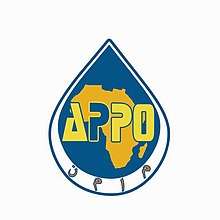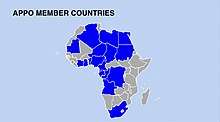African Petroleum Producers' Organization
African Petroleum Producers Organization (APPO) (Organisation Africaine des Producteurs Pétroliers in French, Organização dos Produtores Africanos de Petróleo in Portuguese and المنظمة الأفريقية لمنتجي البترول in Arabic) is an organization of African countries producing petroleum. It was created on January 27, 1987 in Lagos, Nigeria, to serve as a platform for cooperation and harmonization of efforts, collaboration, sharing of knowledge and skills among African oil producing countries. The headquarters of the organization is in Brazzaville in the Congo. The Organization changed its name from African Petroleum Producers Association to African Petroleum Producers Organization in 2017. [1]


The founding of APPO was spearheaded by Nigeria as an effort to mitigate the nation's dependency on Western technology and Western markets for oil export revenues. The objective of APPO is to promote cooperation in petrochemical research and technology.
Mission and vision
APPO's mission is to promote cooperation in the field of hydrocarbons of its Member Countries and other global institutions to foster fruitful collaboration and partnerships while utilizing petroleum as a catalyst for energy security, sustainable development and economic diversification in Africa.
APPO aspires to be the World's reference and lead institution on Africa's hydro-carbon matters.
Membership
The following African states are members of the African Petroleum Producers Organization:
| State | Year of Entry | Notes | |
|---|---|---|---|
| Algeria | 1987 | [2] | |
| Angola | 1987 | [2] | |
| Benin | 1987 | [2] | |
| Cameroon | 1987 | [2] | |
| Chad | 2005 | [2] | |
| Congo, Republic of the | 1987 | [2] | |
| Congo, Democratic Republic of the | 1989 | [3] | |
| Côte d'Ivoire | 1989 | [3] | |
| Egypt | 1989 | [3] | |
| Equatorial Guinea | 1996 | [2] | |
| Gabon | 1987 | [2] | |
| Ghana | 2011 | [4] | |
| Libya | 1987 | [2] | |
| Mauritania | 2008 | [5] | |
| Niger | 2012 | [2] | |
| Nigeria | 1987 | [2] | |
| South Africa | 2005 | [2] | |
| Sudan | 2008 | [5] |
Strategic objectives
- Member Countries' Cooperation: Promote cooperation among Member Countries and other global institutions in various sectors of the hydrocarbon industry: commercial, scientific, technical, technological, legal, fiscal as well as in the field of human resources;
- African Energy Development: Promote the development of regional markets and coordinated energy integration strategies in the continent;
- High Level Studies & Partnerships: Develop research programmes about the major challenges in the petroleum sector of African countries,
- Socioeconomic Development: Promote economic development and market diversification activities by enhancing hydrocarbon sector local procurement, employment and gender diversification.
- Environmental Protection: Promote environmental protection and management policies.
- International Best Practices: Promote the use of international best practices.
- Organizational Visibility: Increase the visibility and level of awareness of APPO as a leader and reference institution on petroleum within and beyond Africa.
Leadership and decision making
The leadership of APPO consists of:
- Council of Ministers
- Executive Board
- Secretary General
- Managing Directors of National Oil Companies
Footnotes
- Petroleum reform talk: APPA to APPO: https://www.vanguardngr.com/2017/07/petroleum-reform-talk-appa-appo
- APPA Bulletin 9, Page 22: http://www.appa.int/en/pub/Bulletin_APPA-n9_eng.pdf Archived 2011-07-22 at the Wayback Machine
- APPA Bulletin 9, Page 22: http://www.appa.int/en/pub/Bulletin_APPA-n9_eng.pdf Archived 2011-07-22 at the Wayback Machine
(Although not directly mentioned.) - APPA Bulletin 9, Page 22: http://www.appa.int/en/pmbres/ghana.html Archived 2012-02-24 at the Wayback Machine
- African Petroleum Producers Association website: http://www.appa.int/en/pmbres/pang.html Archived 2009-04-24 at the Wayback Machine